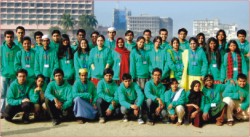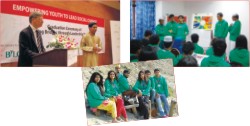Feature
Uniting the young generation
Amiya Atahar
 Building on its past success, the program competitively selected 42 students from the three different educational streams namely English Medium, Bengali Medium and Madrassa educational system, in equal proportion, and started BBLT season 3. The selection process was very challenging to ensure that the chosen participants would be able to quickly grasp the concepts introduced and practised in the training. The comprehensive program aimed to push students to expand their level of understanding and tolerance, and to explore areas outside their comfort zone. Building on its past success, the program competitively selected 42 students from the three different educational streams namely English Medium, Bengali Medium and Madrassa educational system, in equal proportion, and started BBLT season 3. The selection process was very challenging to ensure that the chosen participants would be able to quickly grasp the concepts introduced and practised in the training. The comprehensive program aimed to push students to expand their level of understanding and tolerance, and to explore areas outside their comfort zone.
The BBLT program focuses on three factors: building bridges, leadership training and community service. The first component, 'building bridges' was accomplished by bringing together the students of three different mediums of education and bridging the communication gap between them. This is the first ever initiative by any institution to properly address the different values and voices under the same platform. To advance as a community, one must learn to understand the different perspectives in the community and BYLC's initiative to foster such level of communication is exemplary. The second component, leadership training, did not transform students into leaders overnight; rather, an atmosphere was created which allowed the students to discover and develop the various aspects of leadership, taught in real time. The third component, community service and active citizenship, was the application of the other two components into the local community. The use of teamwork and leadership skills were tested as the students ventured out to do what is at the heart of leadership: serving the community.
Over the following six days, each student presented his or her case to the other team members, who analysed it thoroughly, scrutinizing every detail. Some basic things to identify in each case were: who played the main roles in this case? And what could be the reason, the 'voice', behind them making the decisions that they did? “At the heart of change is loss,” Ejaj Ahmad, founder of BYLC and the lead instructor in the program, stated in class many times, “and the loss is what people fear, not change.” So what were the losses in the case? These questions helped the students pinpoint the problems and evaluate them.
 The students were asked to create an artwork within their teams expressing their understanding of leadership. Both teamwork and leadership were The students were asked to create an artwork within their teams expressing their understanding of leadership. Both teamwork and leadership were
exercised here as each team presented their perception of leadership through fabulous artwork. All the teams put up a great show! The next few days were dedicated to enhancing the participants' public speaking skills. A fun-filled poetry session was followed by two days of short speeches from the students. They were given guidelines and a general format to follow loosely, demonstrated in class through speeches from the facilitators and Ejaj Ahmad. Each student stood on the table and delivered a 4-minute speech of his or her own topic of interest. The rest of the students marked them based on structure, logic and delivery.
The six small groups carried out six different projects targeting the major problems in the slum. The six projects were: Health, Sanitation, Cleanliness, Adult Literacy, Skill Development and Water. While some conducted trainings to change people's behaviour and prior values, some also served by bringing immediate changes in the community in the form of organizing a free health camp, distributing public waste bins or donating pure water filters and other cleaning materials.
Through innovative ways of storytelling and showcasing Meena cartoons, the sanitation team, Rongdhnou, raised awareness among the kids to keep the environment clean. They also designed specific head bands, conveying a strong message to the people in the locality. Avijattri, the water team, propagated the need for pure drinking water via poster presentations. They also demonstrated filter systems such as charcoal filters to raise awareness. Eventually, with the aid of Water Aid, the group delivered three water filter systems to three community schools. Onirban, the cleanliness team, taught the kids of the slum to properly wash their hands using an innovative 8-step method. Besides, they also asserted on other cleanliness issues such as brushing teeth, cutting nails and wearing slippers. As part of their project, the group also donated 130 pieces of Dettol soap, 25 nail cutters and 6 brooms to the locality.
Ogropothik, the health team, diagnosed the dire situation in the slum and called for adaptive changes among the people by bringing in professional doctors to train them on a healthy way of living. Medicines and drugs were more of a technical fix; more important was the change in attitude. Moreover, the team also organized a health camp to proffer free medical services for the people in the locality. They also gave away some important vitamins and first aid kits to the patients. Shoptorshee, focused on generating skill development among the unemployed women in the slum. They conceived a brilliant idea of cultivating mushroom at affordable prices, which also had a great market demand. With the aid of professional trainers, the team managed to instill the change in people's mindset for their greater interest. The adult literacy group, Torongo, created innovative masks for the New Year and sold it to raise funds using which they purchased the necessary stationeries for the adults and started an adult education center there. Later on, all the students had to demonstrate their activities in the community through a report and a poster presentation.
The purpose was to unite the youth representing diverse backgrounds of Bangladesh to ensure that they know how to communicate with different groups of people. The purpose was to raise awareness amongst the youth of their responsibilities towards their country. But most importantly, the purpose was to nurture the next generation of leaders.
Amiya Atahar is a BBLT 3 graduate
|
